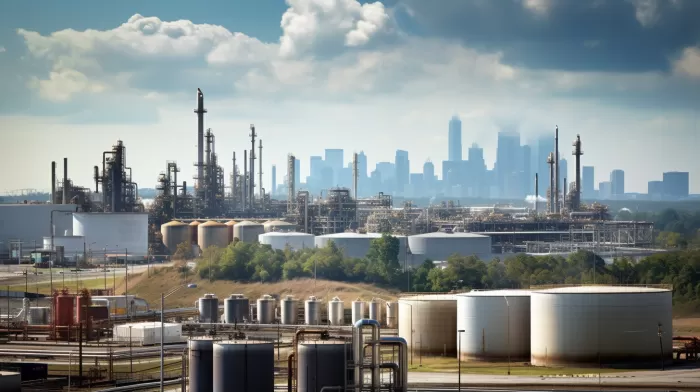Non-Hodgkin’s lymphoma, a type of blood cancer, has seen a significant rise in towns like Atlanta, Savannah, and Augusta, GA within the past two decades. Experts believe they may have uncovered the reason behind this increase: the release of benzene into the air and water by petroleum refineries and certain manufacturing plants.
The Dangers of Benzene Exposure
Benzene is a volatile, colorless liquid that is highly flammable and has a sweet odor. It is used in the production of various chemicals, plastics, and synthetic fibers. When it comes to human health, benzene is highly toxic. Short-term exposure to benzene can cause headaches, dizziness, and confusion, while long-term exposure can lead to harmful effects on bone marrow and blood production. Benzene has also been classified as a Group 1 carcinogen by the International Agency for Research on Cancer (IARC), meaning that it has been proven to cause cancer in humans.
The Link Between Benzene and Non-Hodgkin’s Lymphoma
Researchers investigating cancer rates in Georgia found that the metro-Atlanta region, Augusta, and Savannah had the highest incidences of non-Hodgkin’s lymphoma. They also identified cancer hotspots surrounding plants that released benzene in the metro-Atlanta area, as well as one benzene release site in Savannah. Their findings suggest that for every extra mile you put between your home and a facility that releases benzene, you decrease your risk of non-Hodgkin’s lymphoma by 0.31 percent.
Given the established connections between benzene exposure and non-Hodgkin’s lymphoma, it is essential for those living close to facilities that release this harmful chemical to understand the risks and take measures to protect themselves and their families.
How to Minimize Your Risk
To lower your risk of benzene exposure, consider these steps:
- Stay informed: Keep track of companies or facilities in your area that are known to release benzene into the environment. If possible, try to avoid living or spending excessive amounts of time near such facilities.
-
Improve indoor air quality: Ensure proper ventilation in your homes and workplaces. Use air purifiers with activated carbon filters, which are known to help remove benzene from the air. Regularly clean air ducts and replace filters to maximize efficiency.
-
Avoid using benzene-containing household products: Some common household products, such as glues, solvents, and paint strippers, may contain benzene. Opt for benzene-free alternatives and always use products in well-ventilated areas.
-
Limit your exposure to car exhaust: Cars are a notorious source of benzene emissions. Limit the time you spend in high-traffic areas or near idling vehicles to minimize your exposure. Don’t exercise during rush hour near busy roads, as your body will intake more air than usual and consequently more pollution.
-
Monitor your workplace: If you work in an environment or occupation that involves benzene exposure, such as at a refinery or chemical plant, ensure your employer follows strict safety guidelines and provides proper personal protective equipment. Be diligent in using the equipment and following safety procedures.
-
Speak up: Report any suspected instances of excessive benzene emissions or violations to local regulatory agencies or environmental organizations. Pressure lawmakers to enforce stricter regulations on benzene emissions and protect public health.
Taking Action Against Benzene Emissions
It is critical for communities, lawmakers, and individuals to understand the dangers of benzene exposure and work together to reduce emissions in affected areas. Fostering awareness of the issue, supporting stringent environmental regulations, and investing in alternative, environmentally friendly industries can help create safer living environments for all.
While it’s important to address benzene emissions and protect public health, addressing the root causes of cancer is also crucial. Adopting a healthy lifestyle that includes regular exercise, a balanced diet, stress management, and limited exposure to harmful chemicals can go a long way in reducing your cancer risk and promoting overall wellness.
In conclusion, the rise in non-Hodgkin’s lymphoma cases in cities like Atlanta, Savannah, and Augusta can be linked to exposure to benzene emitted by petroleum refineries and specific manufacturing plants. By understanding the risks and taking steps to protect oneself and the community, individuals can help reduce the dangers and promote healthier living.



